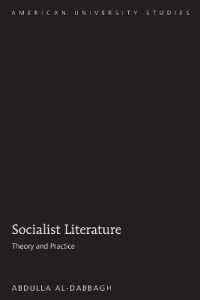- ホーム
- > 洋書
- > 英文書
- > Literary Criticism
Full Description
Tales of xenoglossia—the instantaneous ability to read, to write, to speak, or to understand a foreign language—have long captivated audiences. Perhaps most popular in Christian religious literature, these stories celebrate the erasing of all linguistic differences and the creation of wider spiritual communities. The accounts of miraculous language acquisition that appeared in the Bible inspired similar accounts in the Middle Ages. Though medieval xenoglossic miracles have their origins in those biblical stories, the medieval narratives have more complex implications. In The Gift of Tongues, Christine Cooper-Rompato examines a wide range of sources to show that claims of miraculous language are much more important to medieval religious culture than previously recognized and are crucial to understanding late medieval English writers such as Geoffrey Chaucer and Margery Kempe.
Contents
Contents
Acknowledgments
Introduction
1. Miraculous Translations: Gifts of Vernacular Tongues in Later Medieval Vitae
2. Miraculous Literacies: Medieval Women's Miraculous Experiences of Latin
3. "An Alien to Understand Her": Miraculous and Mundane Translation in The Book of Margery Kempe
4. Women's Miraculous Translation in Chaucer's Canterbury Tales
Conclusion
Selected Bibliography
Index






